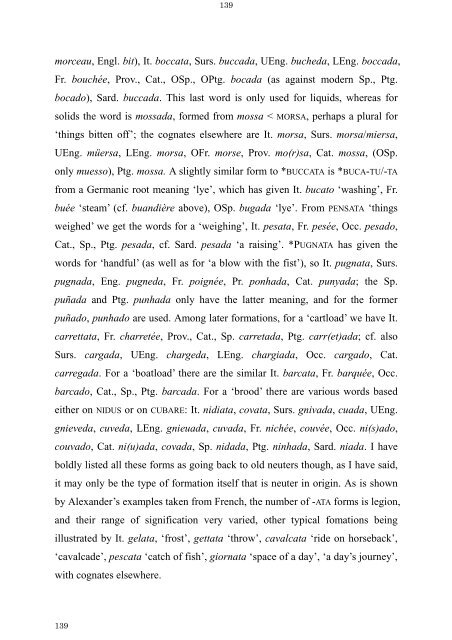The Latin Neuter Plurals in Romance - Page ON
The Latin Neuter Plurals in Romance - Page ON
The Latin Neuter Plurals in Romance - Page ON
You also want an ePaper? Increase the reach of your titles
YUMPU automatically turns print PDFs into web optimized ePapers that Google loves.
139<br />
139<br />
morceau, Engl. bit), It. boccata, Surs. buccada, UEng. bucheda, LEng. boccada,<br />
Fr. bouchée, Prov., Cat., OSp., OPtg. bocada (as aga<strong>in</strong>st modern Sp., Ptg.<br />
bocado), Sard. buccada. This last word is only used for liquids, whereas for<br />
solids the word is mossada, formed from mossa < MORSA, perhaps a plural for<br />
‘th<strong>in</strong>gs bitten off’; the cognates elsewhere are It. morsa, Surs. morsa/miersa,<br />
UEng. müersa, LEng. morsa, OFr. morse, Prov. mo(r)sa, Cat. mossa, (OSp.<br />
only muesso), Ptg. mossa. A slightly similar form to *BUCCATA is *BUCA-TU/-TA<br />
from a Germanic root mean<strong>in</strong>g ‘lye’, which has given It. bucato ‘wash<strong>in</strong>g’, Fr.<br />
buée ‘steam’ (cf. buandière above), OSp. bugada ‘lye’. From PENSATA ‘th<strong>in</strong>gs<br />
weighed’ we get the words for a ‘weigh<strong>in</strong>g’, It. pesata, Fr. pesée, Occ. pesado,<br />
Cat., Sp., Ptg. pesada, cf. Sard. pesada ‘a rais<strong>in</strong>g’. *PUGNATA has given the<br />
words for ‘handful’ (as well as for ‘a blow with the fist’), so It. pugnata, Surs.<br />
pugnada, Eng. pugneda, Fr. poignée, Pr. ponhada, Cat. punyada; the Sp.<br />
puñada and Ptg. punhada only have the latter mean<strong>in</strong>g, and for the former<br />
puñado, punhado are used. Among later formations, for a ‘cartload’ we have It.<br />
carrettata, Fr. charretée, Prov., Cat., Sp. carretada, Ptg. carr(et)ada; cf. also<br />
Surs. cargada, UEng. chargeda, LEng. chargiada, Occ. cargado, Cat.<br />
carregada. For a ‘boatload’ there are the similar It. barcata, Fr. barquée, Occ.<br />
barcado, Cat., Sp., Ptg. barcada. For a ‘brood’ there are various words based<br />
either on NIDUS or on CUBARE: It. nidiata, covata, Surs. gnivada, cuada, UEng.<br />
gnieveda, cuveda, LEng. gnieuada, cuvada, Fr. nichée, couvée, Occ. ni(s)ado,<br />
couvado, Cat. ni(u)ada, covada, Sp. nidada, Ptg. n<strong>in</strong>hada, Sard. niada. I have<br />
boldly listed all these forms as go<strong>in</strong>g back to old neuters though, as I have said,<br />
it may only be the type of formation itself that is neuter <strong>in</strong> orig<strong>in</strong>. As is shown<br />
by Alexander’s examples taken from French, the number of -ATA forms is legion,<br />
and their range of signification very varied, other typical fomations be<strong>in</strong>g<br />
illustrated by It. gelata, ‘frost’, gettata ‘throw’, cavalcata ‘ride on horseback’,<br />
‘cavalcade’, pescata ‘catch of fish’, giornata ‘space of a day’, ‘a day’s journey’,<br />
with cognates elsewhere.









